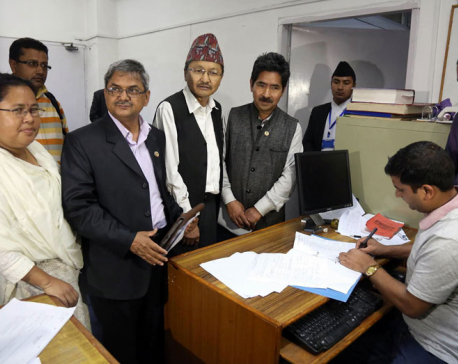
OR
News Analysis
Ruling parties turning to 'fence-sitters' for way out
Published On: March 13, 2017 01:20 AM NPT By: Kosh Raj Koirala | @KoshRKoirala
KATHMANDU, March 13: As the country prepares for local-level elections on May 14 after a hiatus of 20 years, the Saptari incident last week has further polarized the already fractured politics of Nepal, leaving the polls uncertain at least in Province 2.
The incident has not only made the UML, that remains opposed to constitution amendment, further stiffen its stand on the issue, but also given some reasonable justification for the agitating United Democratic Madhesi Front (UDMF) to harden its stance in favor of constitutional amendment and withdrawal of the poll decision.
In an apparent bid to pressure the government, the agitating UDMF, that had supported the Dahal government, is formally withdrawing its support effective from Monday. The UDMF decision taken against the backdrop of the Saptari incident in which five of its cadres were killed in police gunfire came after the government decided to push forward with the election process and put the constitution amendment bill on hold.
Earlier, Prime Minister Pushpa Kamal Dahal had tried to persuade the UDMF to take part in the election, with a promise to push the amendment bill forward when they had the requisite two-thirds majority in parliament. The ruling parties have failed to garner the two-third majority, given the persistent non-cooperation of the UML-led nine-party opposition alliance.
Under pressure from both the UDMF and the opposition parties, Prime Minister Dahal now appears to be trying to bring on board the parties that have so far remained 'fence sitters' on the issue of constitution amendment. The prime minister on Thursday inducted into his cabinet RPP Chairman Kamal Thapa, who has remained non-committal on the amendment, even though two of his party colleagues are already part of the government.
Political analyst Prof. Krishna Pokharel sees this as an attempt by the prime minister to pressure the UML to give up its rigid stance on constitution amendment. “It appears the ruling parties are trying to bring the 'fence-sitter' parties on board to put the UML in a tight corner. UML will have to be ready to make some compromises at the end should the ruling parties garnered the required votes,” he told Republica.
Sources close to Prime Minister Dahal said quiet negotiations are underway to bring the Bijaya Gachchhadar-led Madhesi People's Rights Forum (Democratic) and a few other fringe parties in the opposition block into the government. Should all the lawmakers of the ruling parties vote for the amendment bill, the ruling coalition will be short of only six votes to secure the required 397 votes.
Currently, the nine-party opposition alliance led by the UML has 201 votes on its side. While the CPN-ML, Nepal Workers Peasants Party and Janamorcha Nepal and the parties led by Laxman Rajbanshi and Meghraj Nepali Nishad are unlikely to quit the UML-led oposition block, Janmukti Party (Loktantrik) (2 seats), Nepal Family Party (2 seats) and Bahujan Shakti Party (1 seat) led by Biswendra Paswan are seen as parties that the ruling parties could successfully persuade to quit the opposition alliance.
But as differences over the constitution amendment exist even within the ruling parties, the 'mathematical exercise' is less likely to yield a way out of the current political stalemate and facilitate the election process. “It is understandable that the parties may not be able to meet all the demands. But the way the major parties are working shows clearly that they are not serious enough towards addressing the constitutional grievances of the agitating parties,” said another political analyst, Prof. Krishna Khanal. "It's high time the top leaders of both ruling and opposition parties shed their personal egos and considerations of partisan gain and loss over the issue of constitutional amementment," he added.
No matter how hard their stances, both the ruling and opposition parties must go for some 'give and take' on the demands put forth by the agitating parties if they are to hold the three tiers of elections by January 21, 2018 to implement the constitution and give a political way out for the country. As the clock is ticking, the choice is up to the major parties whether to push the country towards fresh political uncertainty or along the path of sustainable peace and stability.
You May Like This

Ruling parties promised amendment before 2nd phase: Yadav
KATHMANDU, May 4: A day after its allies in the United Democratic Madhesi Front accused the Federal Socialist Forum Nepal (FSFN)... Read More...

Ruling parties and Madhesi Front register joint amendment proposal
KATHMANDU, April 29: The ruling parties and the parties in the Madhesi Front have registered a joint amendment proposal to... Read More...

Oppn to 'wait and see' as ruling parties bent on tabling amendment
KATHMANDU, Jan 7: The main opposition party, CPN-UML, is in a 'wait and see' mood whether to continue with the House... Read More...










Just In
- Heavy rainfall likely in Bagmati and Sudurpaschim provinces
- Bangladesh protest leaders taken from hospital by police
- Challenges Confronting the New Coalition
- NRB introduces cautiously flexible measures to address ongoing slowdown in various economic sectors
- Forced Covid-19 cremations: is it too late for redemption?
- NRB to provide collateral-free loans to foreign employment seekers
- NEB to publish Grade 12 results next week
- Body handover begins; Relatives remain dissatisfied with insurance, compensation amount







Leave A Comment